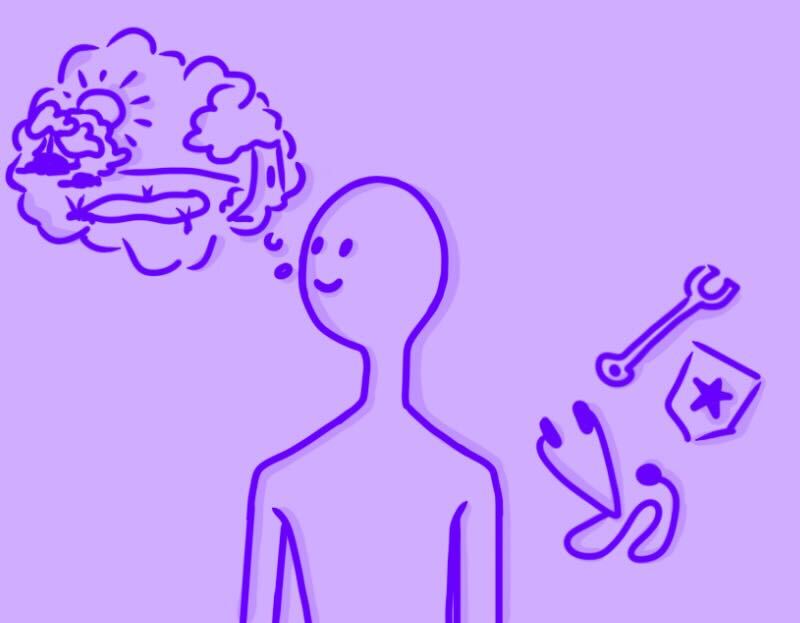Opinion | It’s time to give up the dream job


My childhood memories are filled with adults leaning in to ask me the ultimate question — what is your dream job? I’d answer doctor, lawyer or, if I was feeling wild, writer. Of course, it never dawned on any of us how ridiculous it was to ask a nine-year-old what position of labor they wanted to pursue. It was just something that is expected of kids — to dream of an occupation. As I’ve gotten older and this idea of the dream job has shifted and taken on new forms, I’ve come to realize one thing about the dream job — it’s dead.
Our culture has glamorized the idea of the dream job for decades. The slogans “follow your dreams” and “do what you love and you’ll never work a day in your life” are said to us long before any of us have a job. Movies romanticize the cushy office job or the free-spirited writing career, making it seem like a dream job is a necessary component for a perfect life. Employees use hashtags like #hustle and #grind to display their commitment to pursuing these dream jobs.
All of this stems from the idea that work should be more than just a way to make a living. It’s a calling, a purpose and how you want to change the world. There is even a cultural shift of college students and college-educated workers turning toward the “passion principle” — the prioritization of meaningful work over stable wages and a steady career. This ideology functions on the basis that all jobs have tedious tasks, but if you love what you’re doing, those “tedious tasks” will become fulfilling.
Those who are more passionate about their roles are more likely to be exploited, leading to what’s known as “passion exploitation.” Employers take the genuine passion an employee has and use it as justification to amp up employee hours with little to no wages and handle tasks outside of their job description. In these situations, employers often believe that the employee would have volunteered for the surplus of hours anyway due to their love of the job. This holds especially true in more creative fields where employers believe that because their employees enjoy their work, it is acceptable to put more work on their plate.
Take internships for example. Internships for coveted businesses such as Vogue and Vanity Fair have underpaid and demanded too much of their workers due to their competitive nature. Research shows that employees with internship experience are favored when applying to jobs, but 43% of internships at for-profit companies are unpaid. Still, internship candidates often believe that these positions will foster relationships and open doors that will eventually lead to the dream job, allowing interns to bear poor working conditions.
Chasing the dream job also requires a level of privilege that most Americans don’t have. In order to get the perfect unpaid internship, you have to have some other form of income. Unpaid internships rely on those who have access to other resources and aren’t responsible for their own way of living. There are even instances of bidding wars for internships in which companies require prospective applicants to pay them for the position. Companies such as Vogue and Fox 2000 Pictures make profit from their lucrative internships, knowing that the promise of opportunity will draw in crowds. The very avenues to obtain the dream job have instead become areas of privilege that worsen the inequality gap, or the difference in income between classes.
Interns aren’t the only ones getting exploited for the promise of the dream job. It’s also the people who’ve reached their dream job. Take teachers, for instance. These are individuals who devote themselves to the love of their students, but at what cost? Most teachers expect to have a meaningful impact on their students’ lives, but are often met with a poor work-life balance and little support from their administration. Teachers have reported insane staffing shortages, low wages and a lack of support from their schools’ administrations. Many recount feelings of burnout, disrespect and of being overwhelmed.
The dream job can even sour for those who do achieve the glamorous positions depicted in movies and TV shows. Emmie Harrison-West, a freelance journalist, discovered the hard way that even when employees finally climb the ladder and make it to the glorified jobs from the movies, they don’t always like what they find. Harrison-West recounted her story of finally getting her dream of being a magazine editor by the age of 27, only to realize it didn’t make her happy. The life of glamor and prestige she imagined was instead filled with invoices, spreadsheets and annoying colleagues.
“I’d spent my whole life working up to this pinnacle, climbing this mountain to reach my dream — only to find out that it wasn’t what I expected,” Harrison-West wrote in Cosmopolitan.
Despite these dismal realizations, our culture still promotes the idea of the hustle culture. Even as the dream job seems more and more like just a dream, our society is exhibiting a surge of performative workaholism. People are pledging themselves to a “cult of busy-ness” and promoting a lifestyle where they never are off the clock. Signs and ads that promote lines like “Don’t stop when you’re tired. Stop when you’re done” have normalized these slogans in everyday conversation. It seems like life has become propaganda for work at this point, and the dream job is a way to keep us all locked into the rat chase.
While I’d love to buy into the hashtags and grind mentality, I’m hesitant to believe it will give me the fulfillment promised. I’m not saying don’t follow your dreams, I’m just saying that maybe our dreams shouldn’t involve a job, especially when that job gets in the way of our happiness.
Ebonee Rice-Nguyen writes primarily about political, social and cultural issues. Write to her at EJR76@pitt.edu.
Recent Posts
Photos: Pitt Volleyball vs Ohio State
Pitt Volleyball defeats Ohio State University 3-0 at the Fitzgerald Field House on Saturday April…
SGB addresses concerns about ICE presence on campus, hears SJP lawsuit against administration, approves governing code bill
At its weekly meeting on Tuesday at Nordy’s Place, Student Government Board heard concerns about…
ACLU of Pennsylvania sues Pitt over SJP suspension
The ACLU of Pennsylvania filed a federal civil lawsuit against the University of Pittsburgh and…
Marquan Pope: The ultimate shark
One of the most remarkable things about sharks is that an injury doesn’t deter them.…
Who Asked? // Do we really get a summer vacation?
This installment of Who Asked? by staff writer Brynn Murawski mourns the seemingly impossible perfect…
Notes From an Average Girl // Notes from my junior year
In this edition of Notes From an Average Girl, senior staff writer Madeline Milchman reflects…

